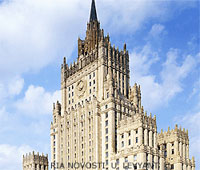Senior Russian diplomat accuses NATO of “hostile intentions”

(Interfax – Moscow, June 9, 2014) Russia sees the NATO build-up near its borders as a display of hostile intentions, views the deployment of additional forces in central and eastern Europe as a breach of the Founding Act [between Russia and NATO], and warns that it will not let this pass without responding.
“We cannot view this sort of military build-up of the alliance’s forces near the borders with Russia in any other way than as a display of hostile intentions. Even if it is on a rotating basis, it is difficult to view the additional deployment of significant NATO combat forces in CEE [central and eastern Europe] as anything other than a direct breach of the provisions of the 1997 Founding Act on Mutual Relations between Russia and NATO,” Russian First Deputy Foreign Minister Vladimir Titov said in an interview with Interfax.
“Naturally, we cannot remain indifferent to the militarization of the states that surround us, and we will be obliged to take all necessary political and military-technical measures in order to reliably ensure our security,” the high-ranking diplomat stressed.
According to him, it is the situation concerning Ukraine that has graphically illustrated the crisis in the Euro-Atlantic security system. “As was the case during the events in the South Caucasus in August 2008, NATO is creating additional problems more quickly than it is helping to address them. The reinforcement of the alliance’s mission to patrol the countries of the Baltic, the build-up of its military presence in the countries of central and eastern Europe and in the waters of the Baltic and Black seas, the intensification of exercises near the Russian border, the use of AWACS long-range radar aircraft in the airspace along the Ukrainian border – all this only introduces additional elements of tension into what is already a difficult situation,” the first deputy foreign minister said.
Titov noted that “attempts to look for a ‘new role’ for the alliance in the well-ploughed furrow of ‘parrying the threat from the East’ could strike a line through many years of efforts to strengthen trust in the military field, and could lead to a ramping-up of tension and an arms race, which would be fraught with serious costs for all Euro-Atlantic states”.
